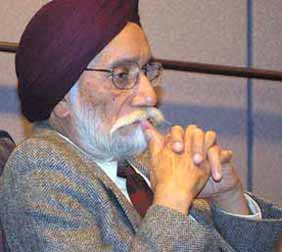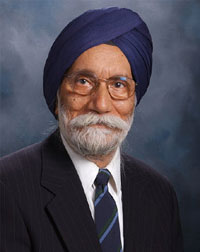
Iowa Eye Association News
Dec. 2002. Ser. 2, suppl. to No. 37
|
|
|
Iowa
Eye Association Annual Meeting to Honor Dr. Sohan Singh Hayreh |
| 
|
| Mark your calendar for
the 2003 Iowa Eye Association Annual Meeting on June 13-14. Dr. Sohan
Singh Hayreh will be honored at the meeting and will deliver the Braley
Lecture. Dr. Sam Masket will be the Wolfe Foundation Lecturer. |
|

Sohan Singh Hayreh,
MD, PhD, FRCS, DSc, FRC Ophth.
Dr. Sohan Singh Hayreh has made
extensive contributions to basic, experimental, and clinical ophthalmology.
He is recognized as an authority on ocular and optic nerve circulation, vascular
disorders of the eye, and giant cell arteritis, among other topics.
Dr. Hayreh began his medical education
in 1946 at King Edward Medical College in Lahore, India, the capital of the
Punjab. One year later, the tragic partition of India occurred and Lahore went
to Pakistan. Because of the bloody riots and reprisals, the Sikh and other non-Muslim
medical students in Lahore fled to the relative safety of the only Medical College
in the Indian part of the Punjab after the partition -- Panjab University, Amritsar.
Dr. Hayreh received the Bachelor
of Medicine & Surgery in 1951 and, in 1959, the Master of Surgery degree
from Panjab University. He began his residency training in surgery at Panjab
University in January 1952 and then, beginning in July 1952, served as Medical
Officer in the Indian Army Medical Corps in rough field conditions near the
Pakistan border for over three years. From September 1955 to September 1961,
he was a Lecturer and then Assistant Professor in the Anatomy Department of
the newly-established Medical College in Patiala, India.
In 1961, he was awarded the prestigious
Beit Memorial Research Fellowship for Medical Research and moved to London to
work with Sir Stuart Duke-Elder at the Institute of Ophthalmology, University
of London until late in 1964. The research he conducted at this time formed
the basis of his Ph.D. thesis from the University of London in 1965. He spent
one year as a Senior House Officer at Birmingham & Midland Eye Hospital
and then returned to the Institute of Ophthalmology and Moorfields Eye Hospital,
London, as Lecturer in Clinical Ophthalmology where he became one of the pioneers
in the field of fluorescein angiography. In 1969, he passed the examinations
for Fellowship of the Royal College of Surgeons of Edinburgh and of the Royal
College of Surgeons of England.
In 1969, he moved to the University
of Edinburgh as Senior Lecturer and later Reader in Ophthalmology and Consultant
Ophthalmologist to the Edinburgh Royal Infirmary.
In 1972, Dr. F. C. Blodi invited
him to join the University of Iowa's Department of Ophthalmology and in 1973,
Dr. Hayreh joined the faculty as Professor and Director of the Ocular Vascular
Clinic and Ocular Vascular Research.
In recognition of his research work
in Ophthalmology, he was awarded the degree of Doctor of Science (Medicine)
by the University of London in January l987. This degree was awarded for his
published research work which was judged by the University of London as "original"
and "of high standard such as would give a candidate an authoritative standing
in Ophthalmology and in his particular field of research (Ocular Circulation
in Health and Disease; Optic Nerve Disorders)" and containing "seminal
publications which have led to extensions or developments by others." In
1999, he assumed emeritus status at the University of Iowa and has been able
to devote himself full-time to his research.
Dr. Hayreh has published over 300 papers and
50 chapters and is recognized as an international authority in the following
areas: |
- Ocular and optic nerve circulation in health and disease.
- Vascular disorders of the retina, choroid, optic disc, optic nerve,
and anterior segment of the eye.
- Fluorescein angiography in ocular and optic disc circulation in health
and disease.
- Disorders of the optic disc, particularly papilledema, glaucomatous
optic neuropathy, and anterior ischemic optic neuropathy.
- Hypertensive fundus changes.
- Rheumatologic diseases of the eye, particularly giant cell arteritis,
scleritis and episcleritis.
|
Distinctions & Awards: |
- 2003 Mildred Weisenfeld Award for Excellence in Ophthalmology: Awarded
by the Association for Research in Vision and Ophthalmology in recognition
of distinguished scholarly contributions to the clinical practice of
ophthalmology and visual sciences.
- 2002 Guest of Honor of the American Academy of Ophthalmology.
- Fellowship of the National Academy of Medical Sciences (India). This
is the highest Medical Academia of India. This Fellowship is “considered
as an honour bestowed as an acknowledgement of ones' achievement in
the Profession”.
- 2001 Arnall Patz Medal of the Macula Society for outstanding contributions
in the retinal vascular and macular diseases.
- Research to Prevent Blindness Senior Scientific Investigator Award:
Awarded by Research to Prevent Blindness Inc., New York for the year
1999.
- Duke-Elder Medal and Lecture of the Royal College of Ophthalmologists,
London, England: Invited to deliver this highly prestigious lecture
at the 1995 annual meeting of the College, and was presented the Duke-Elder
medal.
- Von Sallmann Prize for 1994: This is awarded for "an outstanding
achievement in ophthalmology and vision research" and was presented
at the Biennial Congress of the International Society of Eye Research
meeting in 1994.
- Research to Prevent Blindness Senior Scientific Investigator Award:
Awarded by Research to Prevent Blindness Inc., New York for the year
1993.
- William Mackenzie Medal and Lecture, University of Glasgow, Scotland:
Elected for the award in October, 1988. This highly prestigious award
in ophthalmology is in honor of Dr. William Mackenzie (1791-1868). It
is conferred from time to time, at international level, in recognition
of valuable contributions to ophthalmology.
- Morrison Lecturer of the Royal College of Physicians of Edinburgh,
Scotland: Elected for the award in October, 1988. This prestigious lecture
is in neurological disorders and is in honor of Sir Alexander Morrison
who was President of the Royal College of Physicians in 1828.
- Alcon Recognition Award for Outstanding Research Relevant to the
Field of Ophthalmology: This was awarded by the Alcon Research Institute
for the year 1987.
- Honor Award by the American Academy of Ophthalmology in 1983.
- Edward Nettleship Prize: Elected for the award by the Ophthalmological
Society of the United Kingdom in 1971. The prize was awarded for the
most valuable contribution to ophthalmology from 1965 to 1971 in Great
Britain.
- Middlemore Prize: Awarded for original research by the British Medical
Association in 1966.
- Norman McAllister Gregg Prize and Medal: Awarded from Australia for
the most valuable contribution to knowledge of ophthalmology internationally
from 1958 to 1964.
- Watumull Prize and Gold Medal: Awarded by the Watumull Foundation
Honolulu (USA) for the year 1964, for outstanding contribution to Medical
Research. This prize is presented to a person of any of the various
sciences, humanities or social sciences, who has been associated with
India at any time. It is considered by the Trustees to be equivalent
to the Pulitzer Prize.
- Arris and Gale Lecturer of the Royal College of Surgeons of England:
Elected by the Royal College of Surgeons of England for the year 1963.
- International Instituto Barraquer Barcelona Prize: Elected unanimously
for this prize in ophthalmology for the year 1963.
- Beit Memorial Research Fellow: Elected in 1961 by the University
of London. This is a highly-coveted research fellowship in medical sciences
in the United Kingdom. He worked with Sir Stewart Duke-Elder for three
years and the research work done during this period formed the basis
of his thesis for his Ph.D. from the University of London.
- Shakuntala Amir Chand Prize: Awarded by the Indian Council of Medical
Research for the year 1961. This prize is awarded annually for the best
research done in India.
- College Council Gold Medal: Awarded for Medical Research by the Medical
College, Patiala, Panjab University, India, in 1961.
|
| Sources |
- Hayreh SS. "Adventure
in Three Worlds." Survey of Ophthalmology 35(4): 317-324, 1991.
- "Guest of Honor"
[American Academy of Ophthalmology Annual Meeting 2002]. Available at
http://www.aao.org/member/awards/shayreh.cfm.
Accessed December 6, 2002.
- "Celebrity Interviews:
Interview of Dr. Sohan Singh Hayreh." [Isurgeon: Indian Ophthalmology
on the web]. Available at http://www.isurgeon.org/inter2.html.
Accessed December 6, 2002.
|


| "Together, we have a vision for
the future" |
Copyright © University of Iowa
2002 |
